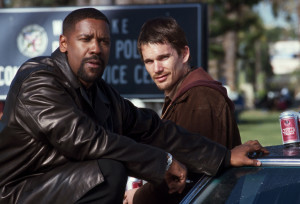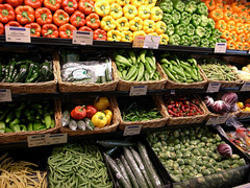Food Safety Talk, a bi-weekly podcast for food safety nerds, by food safety nerds. The podcast is hosted by Ben Chapman and barfblog contributor Don Schaffner, Extension Specialist in Food Science and Professor at Rutgers University. Every two weeks or so, Ben and Don get together virtually and talk for about an hour. They talk about what’s on their minds or in the news regarding food safety, and popular culture. They strive to be relevant, funny and informative — sometimes they succeed. You can download the audio recordings right from the website, or subscribe using iTunes.
The guys start episode 69 by discussing old movies that Ben has never seen, like Play Misty for Me and the Good the Good, the Bad and the Ugly. Talk turned to chimps, Bonzo and Bubbles (not this Bubbles). They then talked about some more recent TV shows like Californication, The Americans, Dr. Who, Intruders, Comic Book men. And yes, the food safety experts are excited about New Girl season 3 on Netflix. The topic shifted to edible marijuana issues in Colorado related to Salmonella contamination and then Don reviewed a book that he recently read, “The minotaur takes a cigarette break” to which he awarded 5 thermometers.
Don and Ben were then joined by special guests Laura Nelson and Dr. Jay Neal. Laura Nelson is Vice President of Business Development and Technical Services at Alchemy Systems, a food industry training solution provider and Jay Nelson is an Associate Professor at the University of Houston. The group had a discussion started on behavior-based food safety training including a survey that Alchemy commissioned, Global Food Training Survey Reveals New Emphasis on Worker Behavior. Laura also talked about an internal report looking at training staff on food safety behaviors including an observation/coaching follow-up. The group talked about some of the common issues that the food industry encounters – staff may have been trained but the actual practices aren’t always happening. Laura spoke about how to get at the reasons behind why practices don’t occur – and that food safety culture is tough for some industry folks to define.
Jay talked about a training technique that includes breaking down specific processes into small pieces and how the literature is pointing to encouraging feedback and coaching along with positive reinforcement. Jay’s experiences are that managers are really important to culture and where their priorities are (sales, customer experience, food safety) will affect team performance. All four of them discussed ways to improve workers skills; Don pointed out that measuring behavior is very hard, and the group discussed some work that Jay had published in this area. Jay shared an amusing classroom social experiment where he teaches his students to empathize with non-english speakers. He assigned the students a recipe in a undecipherable font and only the manager has a clear recipe. They must try to cook together but they are not allowed to talk.
In After Dark, Ben introduced Don to the Sponge Bath, a weird way to keep kitchen sponges sanitized. Ben and Don promised to talk more on the topic in future podcasts.

 the 10th anniversary of the attacks, lawmakers are demanding answers about potential food-related threats and reports that the government could have wasted money on languishing agriculture anti-terror programs.
the 10th anniversary of the attacks, lawmakers are demanding answers about potential food-related threats and reports that the government could have wasted money on languishing agriculture anti-terror programs.